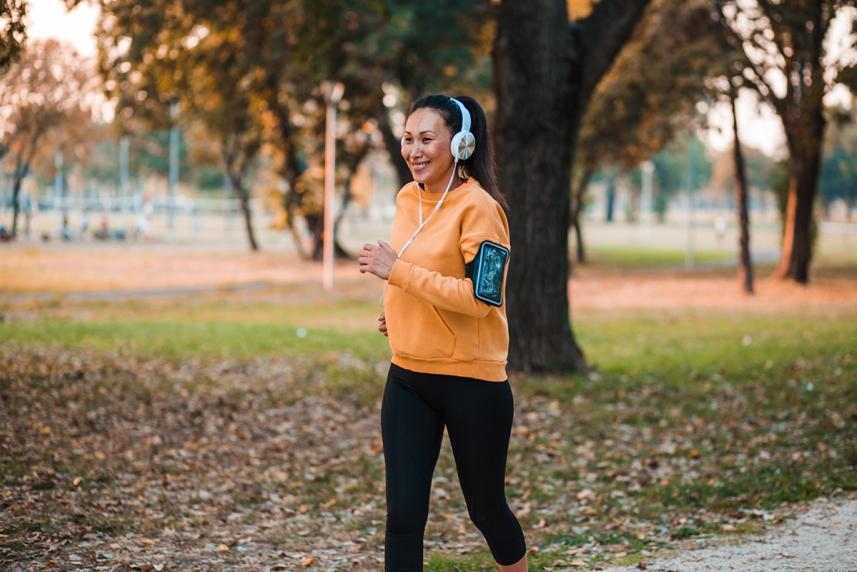That's loud! Everyday activities that could harm your hearing
Some loud noises may cause hearing loss in as little as 5 minutes. Find out what they are and how to protect your precious ears.

Blasting music, roaring crowds, the ear-splitting buzz of a lawn mower. Loud noises are everywhere, every day. But while we may consider these sounds normal, they could spell trouble for our hearing over time.
Of course, there are everyday noises that don’t harm hearing. But too-loud sounds may chip away at your hearing over time by damaging the structures inside your ear. You may be surprised to learn that some things you do every day, such as using a hair dryer or listening to music on your headphones, might expose you to dangerously loud sounds.1
Here’s what you need to know about these everyday sounds and how to help protect your hearing.

Changes in hearing can be subtle at first. Find out if hearing loss may be interfering with your life.
How noise affects your ears and hearing
Deep inside your ears is a snail-shaped cavity called the cochlea. The cochlea is filled with fluid and tiny hair cells. When a sound enters the ears, it travels through the ear canal and the eardrum. The vibrations from the eardrum then travel to the cochlea.2
The hair cells near the wide end of the cochlea pick up higher-pitched sounds, such as an infant crying. Those closer to the center catch lower-pitched sounds, such as the barking of a large dog.2 The cells then send electrical signals through the auditory nerve to the brain, which then identifies the sounds you hear.
Let’s say you go to a noisy, crowded basketball game. Or spend time at a wedding reception where the band is super loud. You may not hear as well for a few hours (or days) afterward. This is because those little hair cells have been bent. Over time, though, loud noises can permanently damage the hair cells and cause some to die.3
The more hair cells get destroyed, the harder it is for your remaining cells to process sounds.
“The signal that comes up to the brain has a garbled or muffled sound quality,” says Victoria Laurella, Au.D. She’s an audiologist at ENT and Allergy Associates in Staten Island, New York.
How loud is too loud?
Sounds are measured in decibels (dB or dBA). Those at or below 70 decibels are considered safe to listen to for any period. Those at 85 decibels or higher are more likely to damage your hearing over time. You need to take precautions to protect your ears from those sounds.1,4
Below are some common loud noises and how they measure in decibels, from quietest to loudest.1,4,5
- Dishwasher, clothes dryer or conversation with a friend: 60 dBA
- Vacuum cleaner: 70 dBA
- Gas-powered lawn mower: 91 dBA
- Hair dryer, kitchen blender or food processor: 94 dBA
- Watching a movie in a theater: 70 to 104 dB
- Gas-powered leaf blower or snowblower: 106 dBA
- Motorcycle: 80 to 110 dB
- Live sports event: 94 to 110 dB
- Listening to music with headphones (at highest volume): 96 to 110 dB
- Rock concert: 95 to 115 dB
- Sirens: 120 dB
- Jackhammer: 130 dBA
- Fireworks at 3 feet or shotgun: 150 dB
And the damage to your ears may happen quickly. For example, mowing the lawn with a gas-powered mower can cause damage after a couple of hours. Attending a rock concert can cause damage in 2 minutes.4
That’s not to say you need to stop going to the movies. Or put away your hair dryer, leaf blower or the power tools you use for home repairs. The key is moderation, says Laurella. “We’re not saying don’t go to concerts or enjoy these things. But do as much as you can to limit how long you’re exposed to these loud noises,” she says.
That is especially true if you work in a factory or in construction, notes Laurella. Why? Because you’re exposed to loud sounds for 8 hours a day or more. That’s when you need hearing protection.
3 ways to help protect your ears
You can’t avoid these noises all the time. But there are things to do to keep your hearing sharp, no matter how loud the sounds around you.
Keep tabs on noises. Be aware of how loud sounds are so you know if and when to protect your hearing. There are free smartphone apps you can download to help you measure sound.
But you don’t necessarily need an app to tell you when the decibel level could be harmful. “If it feels too loud, it’s probably too loud,” Laurella says. You’ll know if you have to yell to be heard above the sound, she adds.
Wear earplugs or earmuffs. When you do go to a concert or use noisy lawn equipment, consider wearing earplugs or protective earmuffs. These devices are helpful if you work or play in noisy settings. They muffle the sounds so the hair cells in your ears don’t get damaged.
- Earplugs fit inside your ears. There are different kinds, including ones made of soft expandable foam. You can also visit a hearing care professional for custom-fitted earplugs.6
- Earmuffs completely cover your outer ears to block out sound.
Keep multiple earplugs or earmuffs in easy-to-find places. Good options include your car, your bag, and next to your power tools or gardening equipment.
Put a cap on loud sounds. “The best way to prevent hearing damage is to limit your exposure to loud noises,” Laurella says. Here are some ways you can do that:6, 7
- Turn down the volume of the TV or music, especially if you listen on headphones.
- At concerts and movie theaters, move away from loud speakers or other noisy areas. And wear earplugs.
- Wear earmuffs when you use lawn mowers, leaf blowers or snowblowers.
- Plug your ears with your fingers or roll up the windows of the car when sirens pass by.
- If you’re at a loud party, take breaks by going outside.
- When watching fireworks, stand or sit farther back. And bring earplugs.
When a hearing exam can help
How will you know your hearing has been damaged? You may have trouble following conversations, especially in noisy places.7 As your hearing gets worse, you might struggle to hear speech even in quieter areas. Sounds may seem muffled, or you may even have ringing in your ears (known as tinnitus).
If you have any of these signs, it’s a good idea to get your hearing checked. Your primary care provider is one place to start. They may refer you to a hearing care professional such as an audiologist for an in-depth exam. Want to meet with a hearing care professional first because you suspect you’re not hearing well? You don’t need a referral to request a full hearing exam and consultation with UnitedHealthcare Hearing.
We live in a noisy world, and you can’t avoid loud sounds all the time. But knowing how to stay safer can keep your ears healthier and happier.
You can take a preliminary hearing test online. While it may not give you official results, it could help you decide whether to get a comprehensive exam.
Sources
- Loud noise dangers American Speech-Language-Hearing Association. Accessed December 20, 2023.
- How do we hear? National Institute on Deafness and Other Communication Disorders. Last updated March 16, 2022.
- About noise-induced hearing loss Centers for Disease Control and Prevention. Last updated April 12, 2024.
- Vital signs: Too loud! For too long! Centers for Disease Control and Prevention. Accessed July 23, 2024.
- What causes noise-induced hearing loss Centers for Disease Control and Prevention. Last updated April 12, 2024.
- Preventing noise-induced hearing loss Centers for Disease Control and Prevention. Last updated April 12, 2024.
- Hearing loss Cleveland Clinic. Last reviewed August 24, 2023.
Information is for educational purposes only and is not a substitute for the advice of a licensed medical provider. Consult your provider prior to making changes to your lifestyle or health care routine.
The online hearing test is not intended to act as a substitute for professional medical advice, diagnosis, or treatment. Talk with your healthcare provider with any question about a medical condition.


